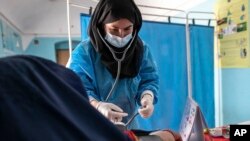Hundreds of Afghan women employed by international non-governmental organizations have started returning to work despite a Taliban order banning their work.
At least three NGOs — CARE International, Save the Children, and International Rescue Committee — have confirmed resumption of humanitarian operations in Afghanistan with Afghan women on staff.
“CARE will be resuming its health and nutrition operations in Afghanistan after obtaining the necessary assurances from the Ministry of Public Health that our female staff will be able to carry out their work safely and unfettered, both in community-based and support roles,” the international humanitarian agency said in a statement on Monday.
“We have received clear, reliable assurances from relevant authorities that our female staff will be safe and can work without obstruction,” Save the Children said in a statement on Sunday.
The NGOs had suspended their activities following a December 24 edict by the Taliban barring Afghan women from NGO work.
The Taliban gave no further explanation for their highly controversial edict that was widely condemned as violating women’s rights. On January 13, the U.N. Security Council called on the Taliban to immediately reverse the ban and allow women to return to work.
The Islamist regime has also barred women and girls from secondary schools and universities.
Aid agencies had warned that a suspension of relief activities, caused by the Taliban’s ban on women’s work, would push Afghanistan deeper into a humanitarian catastrophe.
Almost 19 million Afghans, out of the country’s estimated 36 million population, face critical food insecurity and more than 29 million people need humanitarian assistance, according to aid agencies.
Limited return
Women’s return to work in Afghanistan has been limited to the health sector and some educational activities, NGOs say.
The Taliban’s ban remains active on women’s work in other relief activities such as sanitation, food distribution and economic recovery.
“Women make up 50% of our workforce… [the] majority of our programs remain on hold,” Save the Children said.
“Without female staff at all levels and across all sectors, we cannot accurately assess needs and deliver aid and programs at the necessary scale,” the International Rescue Committee said.
On Tuesday, Amina Mohammed, U.N. deputy secretary general, arrived in Kabul to talk with Taliban authorities about lifting the ban on women’s work.
Some aid agencies have called on Western diplomats to return to Afghanistan and press Taliban on critical issues such as women’s rights.
“Based on our religious principles and values, we are ready to cooperate in any field,” Zabihullah Mujahid, Taliban’s chief spokesman, tweeted last week.
Taliban officials have previously said the group’s bans on women’s work and education were temporary.




